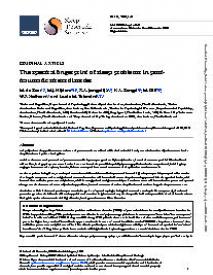The spectral fingerprint of sleep problems in posttraumatic stress disorder
Study Objectives: Sleep problems are a core feature of post-traumatic stress disorder (PTSD). The aim of this study was to find a robust objective measure for the
sleep disturbance in patients having PTSD.
Methods: The current study assessed EEG power across a wide frequency range and multiple scalp locations, in matched trauma-exposed individuals with and
without PTSD, during rapid eye movement (REM) and non-REM (NREM) sleep. In addition, a full polysomnographical evaluation was performed, including sleep
staging and assessment of respiratory function, limb movements, and heart rate. The occurrence of sleep disorders was also assessed.
Results: In patients having PTSD, NREM sleep shows a substantial loss of slow oscillation power and increased higher frequency activity compared with controls.
The change is most pronounced over right-frontal sensors and correlates with insomnia. PTSD REM sleep shows a large power shift in the opposite direction, with
increased slow oscillation power over occipital areas, which is strongly related to nightmare activity and to a lesser extent with insomnia. These pronounced spectral
changes occur in the context of severe subjective sleep problems, increased occurrence of various sleep disorders and modest changes in sleep macrostructure.
Conclusions: This is the first study to show pronounced changes in EEG spectral topologies during both NREM and REM sleep in PTSD. Importantly, the observed
power changes reflect the hallmarks of PTSD sleep problems: insomnia and nightmares and may thus be specific for PTSD. A spectral index derived from these data
distinguishes patients from controls with high effect size, bearing promise as a candidate biomarker.
Geachte bezoeker,
De informatie die u nu opvraagt, kan door psychotraumanet niet aan u worden getoond. Dit kan verschillende redenen hebben,
waarvan (bescherming van het) auteursrecht de meeste voorkomende is. Wanneer het mogelijk is om u door te verwijzen naar de bron
van deze informatie, dan ziet u hier onder een link naar die plek.
Als er geen link staat, kunt u contact opnemen met de bibliotheek,
die u verder op weg kan helpen.
Met vriendelijke groet,
Het psychotraumanet-team.
In: Sleep ISSN 0161-8105 | 43 | 4 | april | zsz269
https://doi.org/10.1093/sleep/zsz269
Online verschenen 08/11/2019


